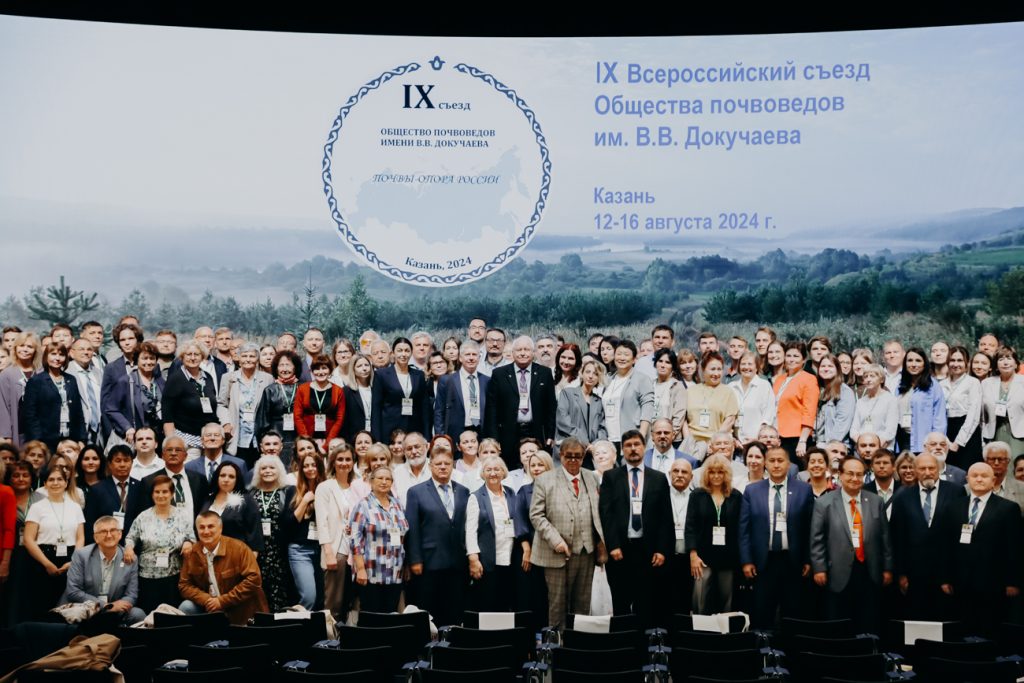Possible association of soil scientists of BRICS countries discussed in Kazan

The city is hosting the 9th All-Russian Congress of Soil Scientists on 12-16 August.
More than 500 researchers from different regions of Russia, as well as from Belarus and Uzbekistan are taking part in the event. Soil scientists and agricultural chemists will share their best practices, familiarize the audience with know-how related to soil assessment, soil conservation, and tools for efficient agro-industry. As part of the symposia and plenary sessions, scientists will discuss such the impact of climate change on soil fertility – from the Far North to the tropics.
The congress is held every four years. This year it is timed to coincide with the 100th anniversary of the International Society of Soil Scientists and the 300th anniversary of the Russian Academy of Sciences. Notably, 120 years ago, in 1904, the Dokuchaev Central Museum of Soil Science in Saint Petersburg was established.
The opening ceremony of the Congress was held with the participation of Pavel Krasilnikov, President of the Dokuchaev Society of Soil Scientists, Pyotr Chekmaryov, Deputy President of the Russian Academy of Sciences, Marat Zyabbarov, Deputy Prime Minister of the Republic of Tatarstan – Minister of Agriculture and Food of the Republic of Tatarstan, Riyaz Minzaripov, President of KFU, Andrei Ivanov, Director of the Dokuchaev Soil Institute, Svetlana Selivanovskaya, Director of KFU’s Institute of Environmental Sciences, and others.
“Finally, our society is renewing interest in the soil resources of the country. Agriculture and farming are actively developing. Very important issues related to carbon balance are being raised, and soil is of fundamental importance in carbon balance. Due to the fact that interest in soil is increasing, we say that soil resources are the basis for sustainable development of our country,” commented Pavel Krasilnikov during the opening ceremony at Bashir Rameev IT Park.
Dr Chekmaryov noted that it was not by chance that the 9th Congress is held in Kazan. One of the oldest universities of the country is located here, and agriculture in Tatarstan, according to him, is one of the best in Russia.
“Tatarstan is the undisputed leader in milk production among the provinces of the Russian Federation, with more than 6 percent of all milk in the country – that’s more than 2 million tons. The Republic is also in the top 10 in the main types of products, such as meat, grain, potatoes, sugar beets, eggs. Today we provide the population of the Republic with all basic foodstuffs in full,” Minister Zyabbarov shared with the congress participants.
Among the numerous greetings received by the participants was a video message from the President of the International Union of Soil Sciences Edoardo Costantini (Italy), who spoke about the activities of the Union, its structure, goals and objectives and wished the participants of the Congress fruitful work and success.
Agriculture has been studied at Kazan University since the university was founded in 1804, noted the President of KFU Riyaz Minzaripov. At that time, the Department of Rural Housekeeping was opened at the Department of Physical and Mathematical Sciences.
“The main task of modern science is to create technologies to ensure highly productive, environmentally friendly farms, to create safe means of chemical and biological protection of plants. And today Russian scientists are accomplishing everything with honor. It is pleasant to note that scientists of Kazan University make their significant contribution here as well,” Minzaripov emphasized.
Svetlana Selivanovskaya mentioned that KFU is the operator of the Volga Carbon Polygon.
“Today the problem of food security in our country and in general on the planet as a whole is the number one issue,” she told the press. “What kind of soil we have now, how many useful substances it contains, and how we take care of this soil in order not to destroy it, but to pass humus, the basis of fertility, to the next generations in sufficient quantity – these are the questions that are extremely important and very timely. The answers to them should be obtained as a result of the work of this Congress.”
The event continued with a series of plenary reports. Speaking about Russia’s food security, the Deputy Chairman of the Russian Academy of Sciences came up with an initiative to create the BRICS Society of Soil Scientists, which is relevant in view of the large-scale summit to be held this fall in Kazan.
“Do we know something about the BRICS as soil scientists and agriculturists, which in principle should create a base for us to seriously enter the markets of these countries as well?” Dr Chekmaryov asked. “Russia is able to produce 200 million tons of grain. The calculation is as follows: if we increase cultivated areas up to 60 million hectares and harvest grain from 35 centners per hectare, we will get more than 200 million tons. But for this we need to apply at least 100 kilograms of mineral fertilizers per hectare.”
Today Russia ranks first in the world in the area of forest lands, he added.
“Soils are the backbone of Russia, it is true. There is nothing else – neither oil, nor gas, nor gold. Soil is our strength. Russia has 400 million hectares of agricultural land, 53 percent of the world’s reserves of black soil, practically on these soils lives up to 70 percent of our population – feeds, shoes, clothes not only ourselves, but already all the countries of the world,” noted Andrei Ivanov.
The program continues until 16 August and includes meetings, field workshops, event for young scientists, and much more.

